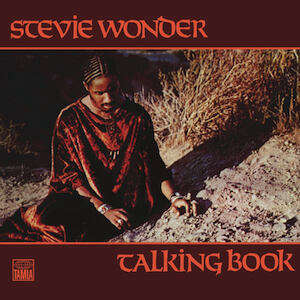
Released on this day on October 28th 1972, the album is thought to be the start of Wonder's classic period
In 1972, Stevie Wonder released Talking Book, his 15th studio album, a record that would come to define the artist’s “classic period.” Already a musical prodigy, Wonder had been pushing the boundaries of Motown and R&B for over a decade, but Talking Book marked a turning point: it showcased his mastery over songwriting, vocal performance, and innovative studio techniques, solidifying his reputation as one of the most influential musicians of his generation.
The album opened with the funky, irresistible “You Are the Sunshine of My Life,” which would go on to become one of Wonder’s most enduring hits. With its gentle piano riff, rich vocal harmonies, and heartfelt lyrics, the song captured the warmth and optimism that would come to characterize much of Wonder’s music in the 1970s. The track won the Grammy Award for Best Male Pop Vocal Performance and remains a staple of his live shows decades later.
“Superstition,” perhaps the album’s most iconic track, immediately established Wonder as a trailblazer in funk. The song’s unforgettable clavinet riff, combined with a propulsive drum groove and horn arrangements, makes it a masterclass in rhythm and groove. Wonder wrote “Superstition” with Jeff Beck in mind, but ultimately recorded it himself, and it became a defining hit of the era. Its lyrical exploration of fate, belief, and human behavior gave the song both depth and universal appeal.
Another standout is “Big Brother,” a socially conscious track that reflects Wonder’s growing engagement with political themes. With pointed lyrics and a gritty funk backdrop, the song addresses issues of authority and injustice, illustrating how Wonder was not just a masterful entertainer but also a keen observer of the world around him. Similarly, tracks like “Lookin’ for Another Pure Love” and “I Believe (When I Fall in Love It Will Be Forever)” showcase his ability to blend romance, introspection, and complex musicality seamlessly.
What makes Talking Book remarkable is not only its individual hits but the cohesion of the album as a whole. Each track demonstrates Wonder’s experimentation with multi-instrumental arrangements and studio technology, including synthesizers and innovative keyboard techniques that would influence generations of musicians. The album also marked a shift in Wonder’s role in the music industry, as he took greater control over production, instrumentation, and songwriting, foreshadowing the fully autonomous works of his classic period, including Innervisions and Songs in the Key of Life.
Critics have often cited Talking Book as the start of Stevie Wonder’s most creatively fertile era, a period in which he would challenge musical conventions, explore personal and political themes, and redefine what a solo artist could achieve. The album remains a touchstone for musicians and fans alike, proving that Wonder’s talent transcends time, genre, and trend. Decades after its release, Talking Book continues to resonate, reminding listeners why Stevie Wonder is not just a performer but a visionary whose music has shaped modern popular culture.
Sources:
- AllMusic
- Grammy Awards
- Wikipedia



 New Music Monday: Five Tracks that look to the return of the sun
New Music Monday: Five Tracks that look to the return of the sun
 World Radio Day - Radio's Enduring Power: Past, Present, Future
World Radio Day - Radio's Enduring Power: Past, Present, Future
 Huntsville Festival of the Arts to Feature David Suzuki in Hybrid Theatre Performance
Huntsville Festival of the Arts to Feature David Suzuki in Hybrid Theatre Performance
 Mississippi Rock Legend Brad Arnold, Voice of 3 Doors Down, Dies at 47
Mississippi Rock Legend Brad Arnold, Voice of 3 Doors Down, Dies at 47












Comments
Add a comment